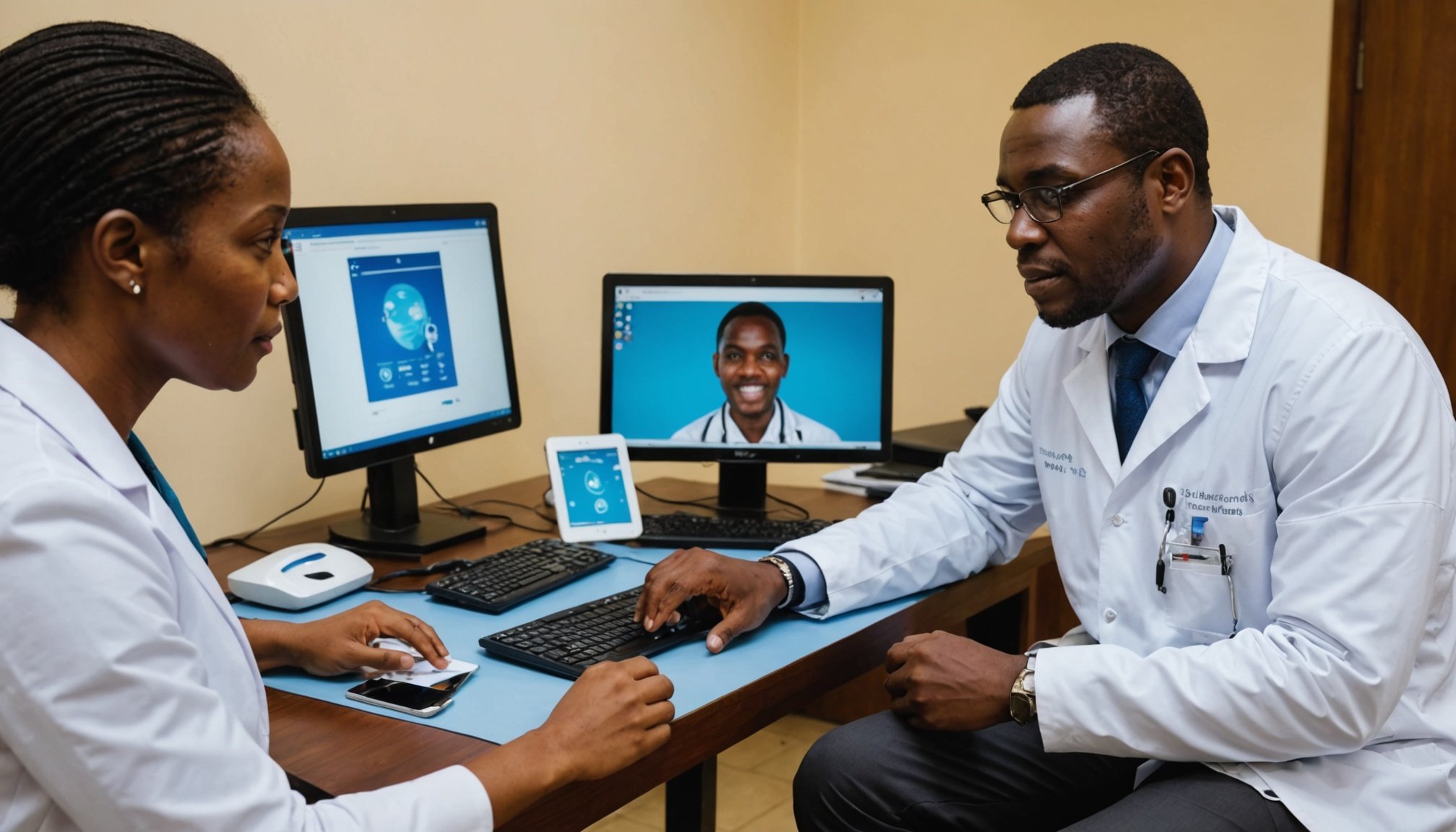Unlocking Potential: How UK Tech Firms Can Thrive in Africa’s Telemedicine Landscape
The Growing Need for Telemedicine in Africa
Africa, with its vast and diverse population, faces significant challenges in the healthcare sector. The continent is home to about 17% of the world’s population but disproportionately accounts for 25% of the global disease burden[5]. This disparity is exacerbated by the rapid population growth, expected to nearly double from 2021 to 2050, reaching approximately 2.5 billion people. This demographic shift underscores an increasing demand for healthcare services and infrastructure.
Telemedicine, leveraging digital technologies, offers a promising solution to bridge the gap between the demand for and access to quality healthcare. UK tech firms, with their advanced technological capabilities and innovative spirit, are well-positioned to make a significant impact in Africa’s telemedicine landscape.
Have you seen this : Boosting Cybersecurity: Strategies for UK Fintech Startups to Strengthen Mobile Wallet Apps
Understanding the African Healthcare Market
The African healthcare market is on a path of significant growth and transformation. By 2030, it is estimated to be worth $259 billion, accounting for 14% of business opportunities in the sector, second only to North America[5].
Key Drivers of Growth
- Population Growth: The rapidly growing population in Africa increases the demand for healthcare services.
- Evolving Disease Burdens: The nature of diseases is changing, with a rise in non-communicable diseases alongside traditional infectious diseases.
- Need for Quality Healthcare: There is a critical need to improve access to quality healthcare, especially in rural and underserved areas.
Country-Specific Opportunities
- South Africa: Boasts one of the largest healthcare markets on the continent, projected to reach $47.1 billion by 2027. Its advanced healthcare infrastructure and services make it an attractive market for UK tech firms[5].
- Nigeria and Kenya: These countries are emerging as key players in the African healthcare sector, with Nigeria being a leading destination for IT outsourcing and Kenya hosting several international health organizations.
Leveraging Digital Technologies for Telemedicine
Digital technologies are the backbone of telemedicine, enabling remote consultations, monitoring, and treatment. Here are some ways UK tech firms can leverage these technologies:
In parallel : Navigating the Legal Landscape: Challenges of Integrating AI into UK Healthcare Systems
Teleconsultation Platforms
- Nurx: A telemedicine startup funded by Y Combinator, Nurx provides a model for teleconsultation services, starting with birth control and PrEP services. UK firms can develop similar platforms tailored to African needs[4].
Mobile Health (mHealth) Solutions
- Mobile Apps: Developing mobile apps that allow patients to schedule appointments, receive medical advice, and monitor their health remotely can be highly effective.
- SMS and Voice Services: Utilizing SMS and voice services can reach a broader audience, especially in areas with limited internet access.
Data Analytics and AI
- Predictive Analytics: Using data analytics and AI to predict disease outbreaks and manage patient data can enhance the efficiency of telemedicine services.
- Personalized Care: AI can help in providing personalized care plans based on patient data, improving the quality of care.
Building Infrastructure and Partnerships
To thrive in Africa’s telemedicine landscape, UK tech firms need to focus on building robust infrastructure and forging strategic partnerships.
Internet and Connectivity
- Internet Penetration: While internet penetration is increasing in Africa, there are still significant gaps, especially in rural areas. Collaborating with local internet service providers can help expand coverage[3].
- Mobile Network Operators: Partnering with mobile network operators can facilitate the development of mHealth solutions.
Local Partnerships
- Healthcare Providers: Collaborating with local healthcare providers and hospitals is crucial for integrating telemedicine services into existing healthcare systems.
- Government Support: Working with governments and health ministries can provide the necessary regulatory support and funding for telemedicine initiatives.
Addressing Challenges and Opportunities
Despite the potential, there are several challenges that UK tech firms need to address when entering the African telemedicine market.
Challenges
- Regulatory Frameworks: Navigating diverse and sometimes complex regulatory frameworks across different African countries can be challenging.
- Infrastructure Limitations: Limited internet and mobile connectivity in some areas can hinder the effectiveness of telemedicine services.
- Cultural and Language Barriers: Understanding and respecting local cultures and languages is essential for the successful implementation of telemedicine services.
Opportunities
- Innovation and Adaptation: The unique challenges in Africa offer opportunities for innovation and adaptation. For example, developing low-bandwidth telemedicine solutions can be highly beneficial.
- Scalability: Successful models can be scaled across different countries, leveraging the similarities in healthcare challenges across the continent.
Practical Insights and Actionable Advice
For UK tech firms looking to enter the African telemedicine market, here are some practical insights and actionable advice:
Conduct Thorough Market Research
- Understand Local Needs: Conduct thorough market research to understand the specific healthcare needs and challenges in different African countries.
- Engage with Local Stakeholders: Engage with local healthcare providers, governments, and communities to gain insights and build trust.
Develop Context-Specific Solutions
- Tailor Solutions: Develop solutions that are tailored to the local context, including language, culture, and technological infrastructure.
- Pilot Projects: Start with pilot projects to test the feasibility and effectiveness of telemedicine services in different settings.
Invest in Digital Skills Development
- Training Programs: Invest in training programs for local healthcare professionals to enhance their digital skills and ability to use telemedicine tools.
- Capacity Building: Build the capacity of local healthcare systems to integrate telemedicine services effectively.
Examples of Successful Initiatives
Several initiatives and companies are already making a significant impact in Africa’s telemedicine landscape.
Solve.Care
- Converging Healthcare and Blockchain: Solve.Care, a company that converges healthcare and blockchain, is working on enhancing access to quality healthcare through innovative technologies. Their model can be replicated and adapted for African contexts[1].
Amref Health Africa
- Digital Health Initiatives: Amref Health Africa, headquartered in Kenya, is running several digital health initiatives across Africa. Their programs focus on improving access to information and community engagement, which can serve as a model for UK tech firms[3].
The potential for UK tech firms to thrive in Africa’s telemedicine landscape is vast and promising. By understanding the local healthcare market, leveraging digital technologies, building infrastructure and partnerships, and addressing challenges, these firms can make a significant impact.
Key Takeaways
- Digital Transformation: Embrace digital transformation to enhance healthcare access and quality.
- Local Partnerships: Forge strong partnerships with local healthcare providers, governments, and communities.
- Context-Specific Solutions: Develop solutions that are tailored to the local context.
- Invest in Digital Skills: Invest in training programs to enhance digital skills among local healthcare professionals.
As the African healthcare sector continues to grow and transform, UK tech firms have a unique opportunity to contribute to this growth and make a lasting impact on the continent’s health and wellbeing.
Table: Comparison of Telemedicine Initiatives in Africa
| Initiative | Country | Key Features | Impact |
|---|---|---|---|
| Nurx | Global | Teleconsultation for birth control and PrEP | Increased access to reproductive health services |
| Solve.Care | Global | Converging healthcare and blockchain | Enhanced access to quality healthcare through blockchain |
| Amref Health Africa | Kenya | Digital health initiatives, community engagement | Improved access to information and healthcare services |
| UK Tech Firms | Africa | Tailored telemedicine solutions, local partnerships | Potential to enhance healthcare access and quality across Africa |
Detailed Bullet Point List: Steps for UK Tech Firms to Enter the African Telemedicine Market
-
Conduct Market Research:
-
Understand local healthcare needs and challenges.
-
Identify key stakeholders and potential partners.
-
Analyze regulatory frameworks and legal requirements.
-
Develop Context-Specific Solutions:
-
Tailor telemedicine platforms to local languages and cultures.
-
Ensure solutions are compatible with local technological infrastructure.
-
Develop low-bandwidth solutions for areas with limited internet access.
-
Build Infrastructure and Partnerships:
-
Collaborate with local internet service providers to expand coverage.
-
Partner with mobile network operators to facilitate mHealth solutions.
-
Work with local healthcare providers and hospitals to integrate telemedicine services.
-
Invest in Digital Skills Development:
-
Implement training programs for local healthcare professionals.
-
Enhance digital literacy among the general population.
-
Build the capacity of local healthcare systems to integrate telemedicine services.
-
Address Challenges and Opportunities:
-
Navigate regulatory frameworks and ensure compliance.
-
Address cultural and language barriers through localized solutions.
-
Innovate and adapt solutions to local challenges and opportunities.
Quotes from Industry Leaders
- Pradeep Goel, CEO of Solve.Care: “The convergence of healthcare and blockchain can significantly enhance access to quality healthcare. Our model focuses on creating a transparent and efficient healthcare system, which can be highly beneficial in African contexts.”[1]
- Herwig Konings, Founding Partner & CEO, Security Token Group: “Digital transformation in healthcare is not just about technology; it’s about creating a system that is accessible, efficient, and sustainable. UK tech firms have a unique opportunity to contribute to this transformation in Africa.”[1]
- Dimitri Sidorovitch, CEO & Founder DeTech.World: “The key to success in Africa’s telemedicine market is understanding the local context and developing solutions that are tailored to those needs. This includes addressing infrastructure limitations and cultural barriers.”[1]
By following these steps, leveraging the right technologies, and understanding the local landscape, UK tech firms can unlock the potential of Africa’s telemedicine market and make a meaningful difference in the lives of millions across the continent.











